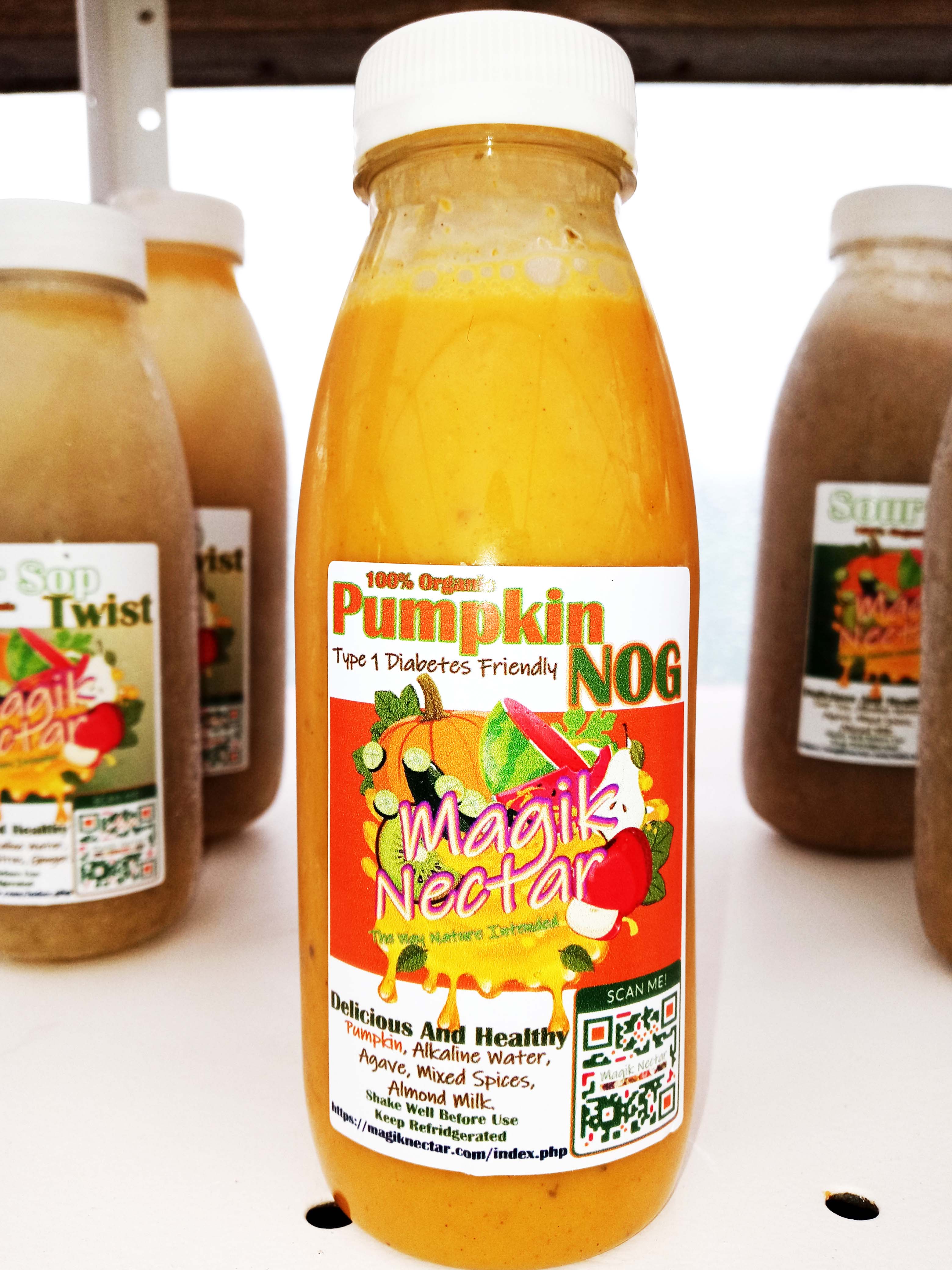Product Details

Benefits
Pumpkin
Alkaline Water
Mixed Spices
Agave Nectar
Almond Milk

Pumpkin Nog £5.00
-
Best Quality
Standards -
Natural Healthy
Products -
The Smart
Choice
Health is paramount to what Magik Nectar do. Yes, our choice of Juices are delicious; however health benefit is our main motivator. delicious is a byproduct of doing it The Way nature Intended.
Health Benefits Of Pumpkin
Just like their orange cousins, the carrot, the sweet potato, and pumpkins are rich in beta carotene. Your body changes this antioxidant to vitamin A. You need vitamin A to see, ward off germs, and for your reproductive system to work the way it should. It... read more
Choose Juice Size:
Choose Quantity
-
Best Quality
Standards -
Natural Healthy
Products -
Smart Oragnic
Services
Health is paramount to what Magik Nectar do. Yes, our choice of Juices are delicious; however health benefit is our main motivator. delicious is a byproduct of doing it The Way nature Intended.
Health Benefits Of Pumpkin
Just like their orange cousins, the carrot, the sweet potato, and pumpkins are rich in beta carotene. Your body changes this antioxidant to vitamin A. You need vitamin A to see, ward off germs, and for your reproductive system to work the way it should. It also helps your heart, lungs, kidneys, and other organs stay healthy.
Great For Your Eyes.
One cup of pumpkin can give you 200% of your recommended daily vitamin A intake. Your eyes will love you for ingesting Pumpkins. Vitamin A helps you have healthy eyes and see more clearly, especially in low-light conditions. Pumpkin’s vitamin A kick brings another biggie: a lowered risk of certain kinds of cancer, like lung or prostate cancer. You don’t get the same protection from vitamin A supplements alone. In addition to beta carotene, pumpkins offer vitamin C, vitamin E, iron, and folate; all of which strengthen your immune system. More pumpkin in your diet can help your immune cells work better to ward off germs and speed healing when you get a wound. Pumpkin’s rich orange color is also a sign it’s packed with potassium. This is crucial for lowering blood pressure.
Unsalted pumpkin seeds are also crammed with minerals and plant sterols that raise HDL cholesterol levels (the “good” kind) and help keep blood pressure numbers down, too. More good news about pumpkins’ potassium power: Studies show that higher potassium levels can lower your risk of stroke, kidney stones, and type 2 diabetes. Another bonus: Potassium may also increase bone mineral density, boosting your bone health. Pumpkins are high in fiber and low in calories. That means they make you feel full without adding to your overall food intake for the day. If you’re looking for a healthy way to fill up, nutrient-rich pumpkin is a good go-to choice. The fiber uptick in your diet promotes digestive health, too, so what goes in comes out on a regular basis.
Pumpkin seeds have tryptophan, an amino acid that helps make a chemical called serotonin. In addition to making you feel good, serotonin is also a key player in promoting good sleep. The antioxidant power of beta carotene in pumpkin works to combat the effects of aging on your skin. It also helps ease inflammation, which keeps your skin -- and your body -- calmer and happier. Your odds of heart disease go down as your fiber intake goes up, and pumpkin is loaded with it. But it isn’t just the fiber that takes care of your ticker: The vitamin A and potassium you get when you add pumpkin to your diet also plays a part in your heart health.
Pumpkin has a special benefit for men.
Pumpkin seed are loaded with zinc. Zinc is particularly beneficial to men’s erectile function. Skip all the artificial erectile cures and simply stick to natural boosters such as Pumpkin. In most cases our bodies underperform simply because it lacks the fuel required to perform at its optimum By simply providing the requisite fuel the body will always be ready to deliver whenever required. Skip the pills; focus on putting in the correct fuels.
What are the best ways to consume Pumpkin?
With all the goodness pumpkins offer, surely an extra-large pumpkin spice latte with a pumpkin muffin can’t hurt. But experts say hold your horses. The best way to get pumpkin’s health benefits is to avoid the sugar and processing of baked goods or pumpkin flavor. Opt for more wholesome choices, like roasted pumpkin, pumpkin puree, pumpkin hummus, or pumpkin soup.
One the most common nutricianal deficiencies in people today is fibre and to help counterct that Magik Nectar has created delicius juices with very high fibre content.
An almond is a seed from a fruit that grows from an almond tree. The fruit holds a hard shell, like a pit, with the almond seed inside. Although technically seeds, almonds are considered nuts. People all over the world have been eating almonds for thousands of years. Today, about 80% of almonds are produced in California. You can find almonds in foods and even as added flavor in drinks around the world. If you’re looking for an addition to your diet that packs a healthy punch, a small serving of almonds from time to time can make a big difference. Nutrition Like many nuts, almonds provide plenty of nutrients. Nutrients per serving An ounce of whole almonds contains: Calories: 152 Protein: 6 grams Fat: 15 grams Carbohydrates: 6 grams Dietary fiber: 3 grams Sugar: 1 gram Almonds are also an excellent source of vitamins and minerals such as: Vitamin E Vitamin B2 Magnesium Phosphorus Potassium Portion size It’s easy to eat too many, which could mean you’re getting more calories and fat than you need. A healthy serving is 1/4 cup, or about 23 almonds. Health Benefits of Almonds The dense nutrition that almonds provide can benefit your body in a number of ways. If you're looking to strengthen your heart, your bones, or even your libido, almonds may help. Almonds could help you: Lower cholesterol Eating almonds helps to lower levels of the bad kind of cholesterol, called low-density lipoprotein (LDL), and increase levels of the good kind, high-density lipoprotein (HDL). Almonds also have anti-inflammatory properties to help protect you from heart disease. Keep a healthy weight Although they're high in calories, almonds could help to reduce your risk of weight gain and obesity — as long as you pay attention to portion size. The protein and fiber in the nuts helps you feel full faster, so you can better control your calorie intake while still satisfying your hunger. Lower blood pressure The vitamin E, potassium, and calcium in almonds could help to lower your blood pressure, which helps protect against heart disease. RELATED: Surprising Reasons You're Gaining Weight Get essential vitamins, minerals, and fiber Almonds are rich in important nutrients for your body, including magnesium, vitamin E, and fiber. Strengthen bones Almonds have both calcium and phosphorus, which are good for bone health. Improve blood sugar control Almonds seem to help curb blood sugar spikes after meals, which is key for people with diabetes. Improve gut health Recent research appears to suggest that almonds may help protect the health and immunity of your gastrointestinal (GI) tract. A healthier gut means a better immune system and a stronger body.
An almond originates as the seed of a fruit grown on the almond tree. Encased within a tough shell akin to a pit, the almond seed is nestled inside the fruit. Despite their classification as seeds, almonds are commonly regarded as nuts.
For millennia, almonds have been a dietary staple worldwide. Presently, approximately 80% of global almond production transpires in California. Almonds feature prominently in various cuisines and are often used to enhance the flavor of beverages.
Incorporating almonds into your diet sporadically can offer significant nutritional benefits.
Nutritional Value
Almonds boast a rich array of nutrients, typical of many nuts. Per serving:
- Calories: 152
- Protein: 6 grams
- Fat: 15 grams
- Carbohydrates: 6 grams
- Dietary fiber: 3 grams
- Sugar: 1 gram
Moreover, almonds serve as an abundant source of essential vitamins and minerals, including:
- Vitamin E
- Vitamin B2
- Magnesium
- Phosphorus
- Potassium
Serving Size
It's crucial to moderate intake, as overconsumption can lead to an excess of calories and fat. A recommended serving size is 1/4 cup, equivalent to roughly 23 almonds.
Health Benefits
Almonds offer dense nutrition, imparting various health advantages to the body. These benefits encompass cardiovascular health, bone strength, and potentially even libido enhancement.
-
Lower Cholesterol: Almonds aid in reducing levels of LDL (low-density lipoprotein) cholesterol while elevating HDL (high-density lipoprotein) cholesterol, thus mitigating the risk of heart disease. Additionally, almonds possess anti-inflammatory properties that contribute to cardiac protection.
-
Weight Management: Despite their calorie density, almonds can help stave off weight gain and obesity when consumed in moderation. Their protein and fiber content promotes satiety, facilitating better control over calorie intake without sacrificing satisfaction.
-
Blood Pressure Regulation: The presence of vitamin E, potassium, and calcium in almonds supports blood pressure regulation, which is pivotal for cardiovascular health.
-
Nutrient Richness: Almonds are abundant in vital nutrients such as magnesium, vitamin E, and fiber, crucial for overall well-being.
-
Bone Health: With their calcium and phosphorus content, almonds foster bone strength.
-
Blood Sugar Control: Almonds demonstrate the potential to attenuate blood sugar spikes post-meals, particularly beneficial for individuals with diabetes.
-
Gut Health Improvement: Emerging research suggests that almonds may contribute to gastrointestinal tract health, bolstering immunity and overall bodily resilience.

